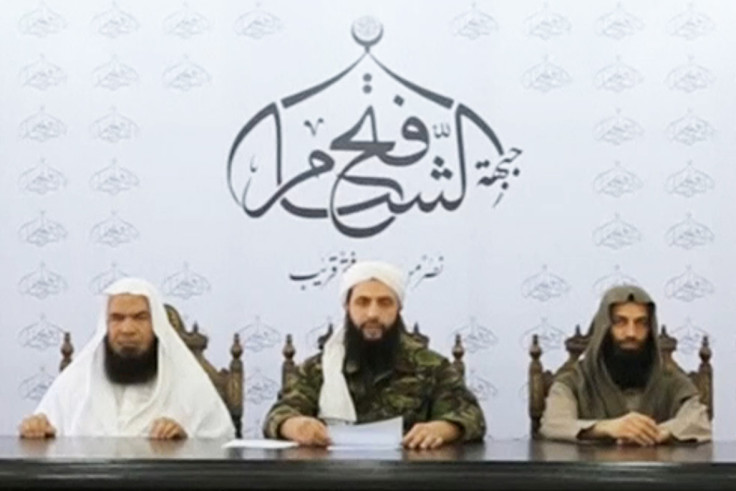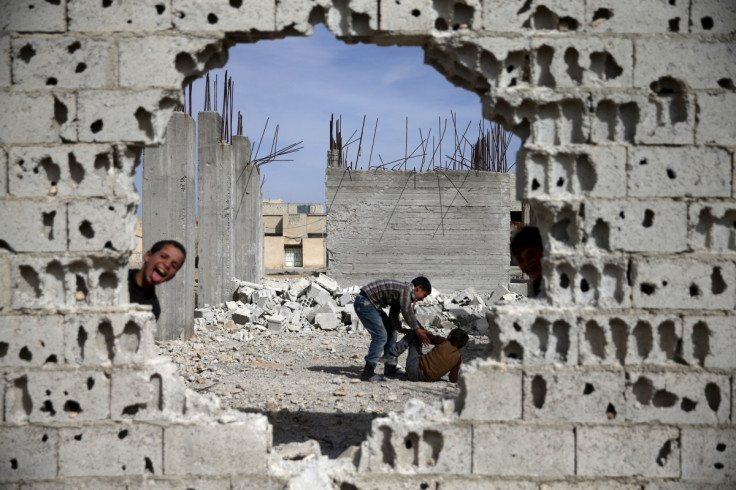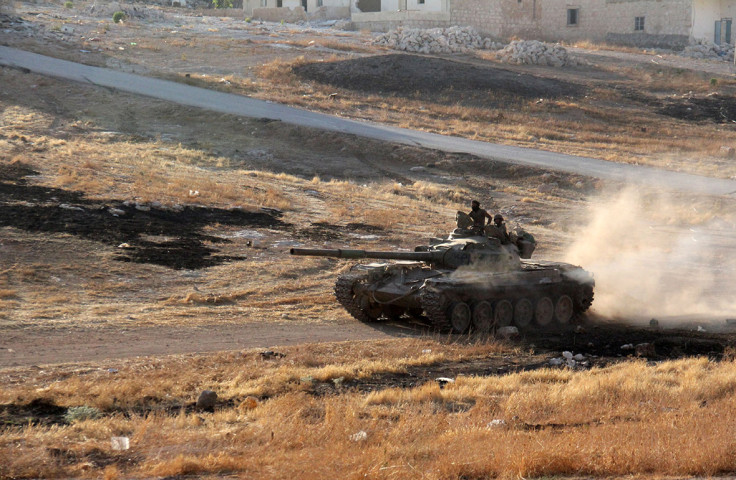Al-Qaeda in Syria: Can a jihadi leopard change its spots?
Jabat Fateh al-Sham – or the Front for the Conquest of Syria – has severed its ties with al-Qaeda

The powerful Syrian jihadist group Jabat al-Nusra (al-Nusra Front) announced last week that it has cut ties with al-Qaeda, rebranding itself as Jabat Fateh al-Sham – or the Front for the Conquest of Syria.
In a video statement published by Al Jazeera, Nusra's emir Abu Mohammad Jolani said the new group has no affiliation to "any external entity" and would "strive toward unity with all groups, in order to unify the ranks of the Mujahideen" and overthrow Bashar al-Assad's government.
Armed opposition factions fighting alongside Nusra have long demanded that it dissociate from al-Qaeda, a group most Syrians see as foreign and extremist. By making this concession, Nusra may be hoping to deepen cooperation with rebel forces, which could complicate plans for expanded U.S.-Russian military cooperation against the jihadist organisation.
Despite the announced split, analysts say that the new group still shares Al Qaeda's violent, transnational goals and radical Salafi-jihadist ideology. Speaking to PBS, Charles Lister, a senior fellow at the Middle East Institute and the author of a book on Syria's insurgency, said:
"Jabhat Fateh al-Sham is no different a jihadi organization than Jabhat al-Nusra. It still stands for the same extremist mores; it still seeks the same long-term objectives; and it still retains all of its several dozen al-Qaeda veteran figures."
Some analysts even question whether the group has truly cut ties with its parent organisation. Thomas Joscelyn, a senior fellow at the Foundation for Defense of Democracies, pointed out in the Long War Journal that Jolani did not publicly break his bay'ah, or oath of allegiance, to al-Qaeda leader Ayman al-Zawahiri, so could still be loyal to him.
Jolani also never explicitly mentioned al-Qaeda in the video, but instead said that Nusra was no longer affiliated to "any external entity." According to Joscelyn, however, "al-Qaeda has a senior leadership cadre and a roster of members inside Syria, meaning al-Qaeda itself is not an "external entity"" in the country.
Closer cooperation with the jihadists could backfire for Syria's beleaguered rebels.
At further proof of this point, sitting on Jolani's right in the video was Ahmad Salama Mabruk, a veteran jihadist and associate of al-Zawahiri whose laptop, captured in Azerbaijan in 1998, was once described by the CIA as the 'Rosetta Stone' of al-Qaeda.
Nusra's transformation into Jabhat Fateh al-Sham has also been officially sanctioned by al-Qaeda's central leadership – a point Jolani was keen to stress and praise al-Zawahiri for in the video. This suggests that the new group is still "beholden" to its parent organisation, according to Sam Heller, a Beirut-based writer and analyst whose research focuses on the rebellion in Syria.
Greater collaboration
Nonetheless, creating the impression that Nusra is no longer linked to al-Qaeda could be beneficial for both groups, analysts say. For the former, it provides an opportunity for greater collaboration with rebel forces and perhaps even a merger with the powerful Salafi movement Ahrar al-Sham.
If the US then bombs the group, killing allied rebel fighters and civilians in the process, Jabhat Fateh al-Sham will be able to portray the U.S. as an enemy of the entire opposition, rather than just jihadists, and use that to win support and cement its own revolutionary credentials.
For al-Qaeda, cutting ties with the group helps to preserve "the long-term viability of the Nusra Front and its jihadi strategic objectives", Lister said. These objectives include the establishment of an Islamic Emirate in rebel-held northern Syria, where Nusra and Ahrar al-Sham are dominant, and then eventually the foundation of a Caliphate.

Closer cooperation with the jihadists could backfire for Syria's beleaguered rebels, however. Not only would it make them more vulnerable to US and Russian bombing, but it would also increase their reliance on Jabhat Fateh al-Sham as a military ally against the Assad regime.
This is likely the group's intention, analysts say. In a paper published on Nusra before Jolani's announcement, Lister warned that any break with al-Qaeda "should be read as a politically smart manoeuvre aimed at further trapping Syrians into their relationship of interdependence with the group."
By building alliances with other insurgents, demonstrating military prowess against the regime and providing services to Syrians in opposition-held areas, the jihadists have sought to win hearts and minds and make both rebels and civilians "dependent" on them, he said.
In the long-term, however, Lister believes that Nusra represents the opposition's "biggest challenge" – "a wolf in sheep's clothing" that is exploiting Syria's revolution to build an Islamic State and secure a base from which to attack the West.
"It is a terrorist group that has nothing to do with the Syrian revolution."
Many Syrian activists who oppose the Assad regime are also deeply suspicious of the group's intentions. In a conversation over email, Rafif Jouejati, the director of the Foundation to Restore Equality and Education in Syria, said that Nusra's "ultimate goal is the establishment of another dictatorship – an Islamic state – in place of the current one."
Abdul, a pro-revolution Syrian who tweets under the name @al_7aleem, describes the group as "a double-edged sword." In the long-term, they may prove even more dangerous than ISIS, he says, because they have a stronger civilian support base and are "thoroughly integrated into Syrian society in some towns in northern Syria."
Wael Aleji, a spokesperson for the Syrian Network for Human Rights based in London, also believes that Nusra poses a threat to the uprising's original values. "This is a group that doesn't believe in democracy, human rights, equal citizenship, freedom of speech and religious freedom", he said via email. "It is a terrorist group that has nothing to do with the Syrian revolution."
Aleji's organisation says Nusra has killed hundreds of civilians over the course of the conflict, including many women and children. It has also been accused of carrying out massacres, car bombings, assassinations, summary executions, torture and kidnappings.
Minority communities in Syria are particularly threatened by the group. Alawite, Christian, Druze and Kurdish civilians have all been targeted and killed by Nusra, as well as alleged homosexuals and women accused of adultery.

Many fear that the jihadists pose an existential threat to these communities. Speaking in June this year, Jolani's second-in-command Sami al-Oraydi urged his followers to "Proceed with (the Alawites) as you would with apostates" – meaning they should be put to death. Jolani has also publicly stated that Alawites will only be safe in Syria if they renounce their faith.
Nusra's brutality and extremism has alienated Syrians living in opposition-held areas, too. In Maarat al-Nu'man, a city in the northwest, the group dispersed revolutionary protests and raided the headquarters of a Free Syrian Army faction in March, fuelling more than 100 days of demonstrations against the jihadists.
Nusra will never be accepted by Syrians fighting for a free and democratic country.
The protests were made possible by the US and Russian-brokered 'cessation of hostilities', which led to the first major demonstrations against the Assad regime in years. According to Lister, this period of relative calm exposed Nusra's greatest weakness:
"Its position as an accepted member of the revolution was inherently dependent on being able to demonstrate its military value in fighting the Assad regime. With conflict dramatically reduced, Jabhat al-Nusra became virtually impotent overnight, re-empowering the vast majority of the opposition, which uphold values diametrically opposed to al-Qaida's extremist interpretation of Islam."
Jouejati believes that jihadist groups like Nusra will never be accepted by Syrians fighting for a free and democratic country. "Those who support the uprising's goals understand that no dictator – whether clean-shaven and in western garb or bearded and in flowing robes – will support the spirit and nature of our revolution", she says.
At its heart, "the revolution's core values are freedom, dignity and democracy for all Syrians, regardless of religious or political beliefs, ethnicity or social background."
Daniel Wickham is a writer and activist with an interest in human rights and the politics of the Middle East and North Africa.
© Copyright IBTimes 2025. All rights reserved.






















